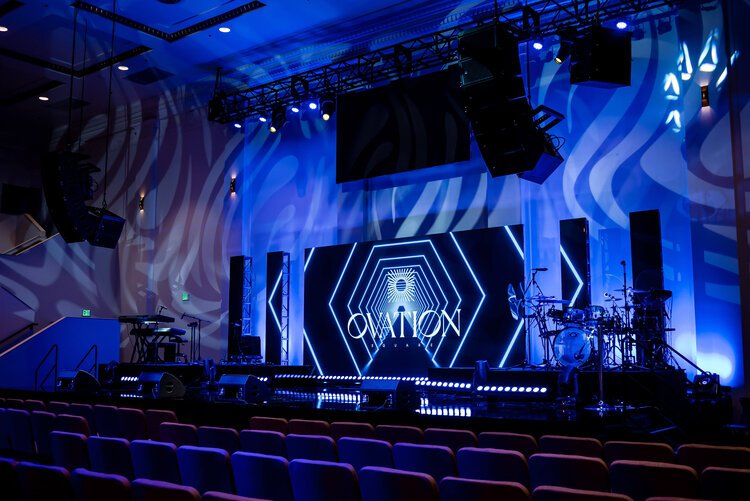How charlotte event companies build networks for clients
Wiki Article
A Deep Dive Into How Event Management Functions to Create Remarkable Experiences
Event management is a complicated technique that combines different elements to craft remarkable experiences. It needs a clear understanding of the event's objective and audience. Planners need to browse budgeting, logistics, and advertising to assure a seamless implementation. Each component plays an essential function in achieving the wanted impact. The trip does not finish with the event itself. There are insights to reveal that can shape future undertakings.The Basics of Event Management
Reliable event management encompasses a series of important concepts that direct the preparation and execution of successful occasions. At its core, it entails understanding the event's function, target market, and desired outcomes. Recognizing the target demographic is vital, as it notifies decisions connected to material, advertising and marketing, and logistics.Budgeting is another fundamental aspect, guaranteeing that resources are alloted successfully while fulfilling the event's purposes. This includes preparation for unpredicted expenses that might arise.
Time management plays an essential duty, as event managers must develop an in-depth timeline to coordinate various tasks and turning points.
In addition, efficient communication among stakeholders, vendors, and staff member is important to ensure positioning and prevent misunderstandings.
Lastly, danger management should be thought about, with contingency strategies in position to resolve prospective challenges, therefore boosting the total experience for participants and ensuring a smooth implementation of the event. (charlotte event companies)

Key Duties in Event Preparation
In event preparation, understanding vital duties is crucial for effective execution. The event planner is accountable for looking after logistics and making sure all facets line up with the vision. Furthermore, reliable vendor management is crucial for preserving top quality and promoting strong collaborations throughout the preparation process.Event Planner Duties
An event organizer coordinates the complex aspects of event preparation, making sure smooth implementation from conception to verdict. They are responsible for conceiving the event theme, setting spending plans, and developing timelines to maintain the project on course. Sychronisation with stakeholders, including customers, venue managers, and volunteers, is essential to align assumptions and assist in interaction. The coordinator additionally looks after logistics, such as catering, transportation, and technology requires, ensuring all parts function harmoniously. They perform website visits, manage routines, and troubleshoot problems that might occur during the event. Post-event, the organizer reviews the event's success, collecting responses and assessing end results to educate future tasks. This multifaceted function calls for strong organizational abilities, attention to detail, and effective social interaction.Vendor Management Basics
Guiding through the landscape of vendor management is vital for successful event planning. Effective vendor management includes recognizing, selecting, and working with providers who provide important solutions, such as food catering, audiovisual assistance, and decor. Event planners should maintain strong interaction with suppliers to guarantee that all elements straighten with the event's vision. Secret roles consist of the supplier supervisor, that manages agreements and negotiations, and the logistics organizer, in charge of on-site configuration and execution. It's imperative to establish clear assumptions and timelines, fostering a collective environment that enhances the total experience. By focusing on these elements, event coordinators can browse potential obstacles, guaranteeing that every information adds to a smooth and unforgettable event.Crafting a Vision: Principle Growth

As soon as a vision is established, it becomes vital to equate it right into workable parts. This consists of defining the ambience, selecting appropriate places, and identifying the event's style. Working together with stakeholders, including sponsors and companions, better improves the concept, making sure that all parties share a combined understanding of the event's objective. Eventually, a well-developed vision not only improves guest involvement but likewise establishes the phase for remarkable experiences that resonate long after the event wraps up.
Budgeting and Resource Appropriation
With a clear vision in position, the next step in event management entails mindful budgeting and source allocation. This crucial phase guarantees that all necessary elements are moneyed and straightened with the event's goals. Event supervisors start by approximating prices related to location option, catering, amusement, and marketing. They create a detailed spending plan that outlines each category, allowing for transparency and liability.Resource allowance expands beyond finances; it also incorporates personnels. Identifying group roles, responsibilities, and timelines is necessary to ensure effectiveness. Event supervisors should likewise take into consideration backups for unforeseen expenses or adjustments in extent, establishing a barrier within the budget plan.
Prioritizing spending on elements that boost visitor experiences is essential. By tactically assigning sources, event managers make best use of effect while preserving economic control. This self-displined approach not only cultivates effective events however likewise develops reliability and depend on with stakeholders and individuals.
Logistics: The Backbone of Event Execution
While budgeting lays the groundwork for an event, logistics act as its foundation, guaranteeing that every element is implemented efficiently and efficiently. charlotte event companies. This incorporates a large range of activities, including venue option, transportation plans, and tools purchase. Reliable logistics management needs thorough planning and sychronisation to guarantee that all aspects straighten with the event's timeline and objectivesKey elements of logistics consist of supply management, where supplies and materials are tracked to protect against shortages, and staffing, which includes recruiting and training workers to take care of various tasks. Communication is likewise crucial, as it assists in collaboration among suppliers, enrollers, and the event group.

Advertising and Promo Strategies
Efficient advertising and marketing and promotion methods are necessary for making the most of attendance and engagement at an event, as they generate interest and excitement amongst possible individuals. Event supervisors use a mix of standard and electronic advertising and marketing strategies to reach their target audience. Social media platforms, email campaigns, and targeted ads are typically made use of to develop buzz and foster area communication. Cooperations with influencers or sector leaders can boost reliability, while engaging material such as videos and reviews can resonate with possible attendees.In enhancement, leveraging event-specific hashtags and developing shareable graphics motivates organic promo among attendees. Early riser ticket offers and exclusive promos can incentivize registration, furthermore boosting passion. Additionally, a well-designed website that uses simple navigating and clear info about the event can boost the user experience. By carrying out these marketing and promo methods, event managers can blog guarantee greater presence and inevitably produce a memorable experience for all individuals.

Determining Success: Feedback and Analysis
Success in event management depends upon robust responses and assessment devices. These processes are vital for establishing the efficiency of an occasion and recognizing areas for improvement. By collecting input from guests, coordinators can evaluate satisfaction degrees, recognize choices, and gauge general effect. Studies and interviews work as important devices for accumulating measurable and qualitative information, permitting complete analysis.Additionally, examining essential performance indicators (KPIs) such as attendance rates, interaction levels, and return on financial investment (ROI) supplies a more clear image of event success. Post-event debriefing sessions with the preparation group also contribute insights, cultivating a culture of continuous enhancement.
have a peek at these guys Inevitably, a methodical technique to responses and evaluation not only improves future occasions yet additionally enhances partnerships with stakeholders. By executing these approaches, event supervisors can produce remarkable experiences that resonate with individuals and drive recurring engagement.
Often Asked Questions
Exactly How Do Event Managers Deal With Unforeseen Difficulties During an Event?
Event managers attend to unforeseen difficulties by staying calmness, assessing the circumstance, and applying contingency plans - charlotte event companies. They interact properly with their group, adjust quickly, and prioritize solutions to ensure the event continues efficiently and effectivelyWhat Modern Technology Devices Are Vital for Modern Event Management?
Necessary modern technology devices for modern event management include event enrollment software program, task management applications, attendee engagement platforms, and analytics tools. These resources improve processes, improve communication, and enhance general event experiences for coordinators and participants alike.Exactly How Do Cultural Distinctions Effect Event Planning and Execution?
Social distinctions considerably influence event preparation and execution. They affect motifs, personalizeds, interaction styles, and assumptions, requiring tailored strategies to ensure inclusivity and respect, inevitably shaping the total experience and success of the event.What Are the Honest Factors To Consider in Event Management?
Honest considerations in event management include transparency, sustainability, social sensitivity, and inclusivity. Organizers should focus on fairness, regard varied audiences, decrease environmental effect, and warranty ease of access to create liable and unforgettable experiences for all individuals.How Can Sustainability Be Integrated Into Event Preparation?
Sustainability can be incorporated into event preparation by utilizing eco-friendly products, decreasing waste, sourcing neighborhood vendors, carrying out carbon balanced out programs, and advertising digital services to lower paper usage, thereby improving ecological consciousness within the event's framework.Report this wiki page